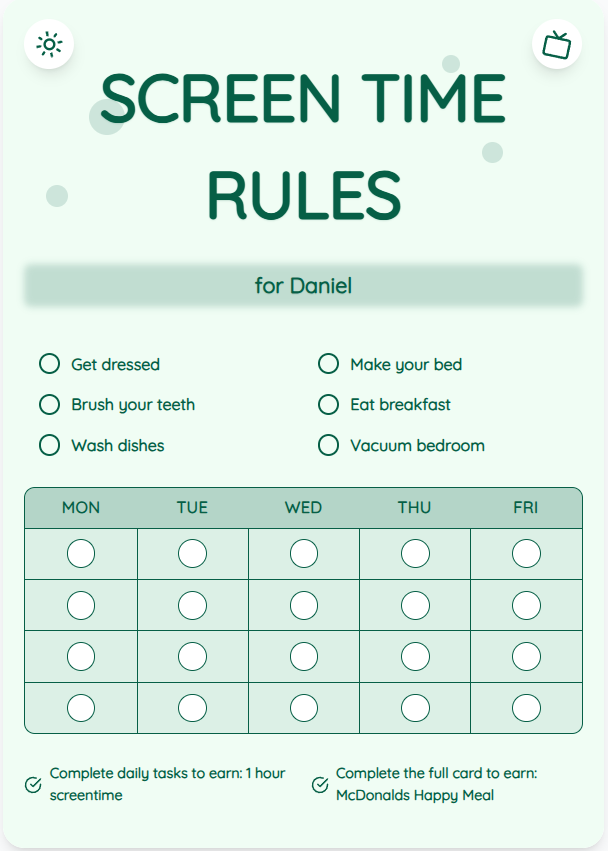The Impact of Screen Time on Brain Development in Children
As a parent, you may wonder how excessive screen time affects your child's brain development. Understanding the impact is crucial in promoting healthy cognitive growth. Let's delve into the effects of screen time on children's brains and explore actionable solutions to manage it effectively.
See What Your Screen Time Chart Will Look Like
Here's an example of a beautiful, customizable screen time rules chart you can create for your family

Understanding the Effects of Screen Time on Brain Development
Excessive screen time can lead to various negative effects on children's brain development. Studies show that prolonged screen exposure can hinder language development, attention span, and cognitive abilities. Additionally, it may impact social skills and emotional regulation. As screens often promote passive consumption, they can limit opportunities for active learning and creative play, essential for holistic brain development.
Practical Tips for Managing Screen Time
To promote healthy brain development, it's essential to establish screen time rules and boundaries. Consider creating a screen time chart tailored to your child's age and needs using tools like ScreenTimeRules.com. Encourage a balanced routine that includes physical activities, reading, and interactive play. Limit screen time before bedtime to ensure quality sleep, vital for brain function. Engage in screen-based activities together to enhance bonding and monitor content for educational value.
Put These Tips Into Action
Create a custom chart to implement these strategies with your child
Setting Limits and Consistency
Consistency is key when managing screen time. Set clear limits on daily screen use and be a role model by demonstrating healthy tech habits. Encourage alternative activities like outdoor play, hobbies, and family outings to reduce screen reliance. Monitor your child's reactions to screen time and adjust limits accordingly. Consistent communication about the importance of balance is crucial for long-term habits.
Practical Tips for Success
- Create a personalized screen time chart for your child's daily use.
- Encourage tech-free zones in the house, such as during meals or family gatherings.
- Discuss the impact of excessive screen time with your child in an age-appropriate manner.
- Explore creative activities like arts and crafts to reduce screen dependency.
Frequently Asked Questions
How does excessive screen time affect brain development?
Excessive screen time can hinder cognitive development, attention span, language skills, and social interactions in children. It may also lead to issues like sleep disturbances and emotional regulation difficulties.
What are the recommended daily screen time limits for children?
Experts suggest limiting screen time to 1-2 hours per day for children aged 2-12 years. However, it's crucial to balance screen use with other enriching activities for holistic development.
How can I create a healthy screen time routine for my child?
To create a healthy screen time routine, establish clear rules, set limits, prioritize quality content, engage in co-viewing experiences, encourage physical activities, and model responsible tech use.
By understanding the effects of screen time on brain development and implementing practical strategies, you can nurture healthy habits in your child. Consider utilizing ScreenTimeRules.com's screen time chart generator to tailor a balanced routine for your family. Embrace a mindful approach towards screen use to foster optimal brain development and harmonious family dynamics.
Ready to Transform Your Family's Screen Time?
Join thousands of parents who have successfully managed screen time with our customizable charts.
